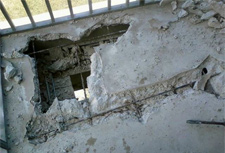|
|
|
|
|
Community Association Update / Issue #25
New Legislation: AB 968 - Clarifying Repair/Replacement of Exclusive Use Common Area
New Legislation: AB 1738 - Attorneys at IDR
New Legislation: AB 2104 - Low-Water Using Plants; Watering During Droughts
Owner Held Liable for Property Damage on 'Nuisance' Grounds
Are You Prepared for the New Annual Disclosures?
|
|
|
This Community Association Update is part of our commitment to providing the highest quality legal services to our clients and industry partners. If your company or Association would like to see a topic or issue covered in future editions, feel free to call our offices, email us, or submit a question online! | |

| Sincerely,
Steven J. Tinnelly, Esq.
|
|
AB 968 Signed: Clarifying Repair/Replacement of Exclusive Use Common Area
New Legislation

A common legal issue affecting Homeowners Associations ("HOAs") deals with determining the extent of the HOA's maintenance and repair responsibilities versus those of its homeowners. Most sets of HOA CC&Rs address the maintenance and repair responsibilities for HOA common areas, the individual units/lots ("separate interests") owned by the homeowners, and any common areas reserved for a particular homeowner's exclusive use ("exclusive use common areas"). In the event that the CC&Rs are inadequate or ambiguous in this respect, Civil Code Section 4775(a) sets forth the following default structure:
Unless otherwise provided in the CC&Rs: (1) the HOA is responsible for "repairing, replacing, or maintaining the common area, other than exclusive use common area"; and (2) the homeowner is responsible for "maintaining [the homeowner's] separate interest and any exclusive use common area appurtenant to the separate interest."
However, there is an ambiguity within this language with regard to exclusive use common area. While "maintaining" exclusive use common area is the homeowner's responsibility, Section 4775 fails to state who exactly is responsible for "repairing" or "replacing" the exclusive use common area. This ambiguity is often problematic for condominium developments that may have numerous exclusive use common areas, such as exterior windows, reserved parking spaces, patios, balconies, etc.
Industry practice has held that the homeowner is only responsible for the basic upkeep/maintenance of the exclusive use common area's usable surfaces, while the HOA would be responsible for any major or structural repairs to the exclusive use common area. We previously blogged about this issue in response to a question on balcony repairs within a condominium development.
Fortunately, the passage of AB 968 (Gordon) will serve to codify industry practice...
Click here to continue reading our blog post entitled:
"AB 968 Signed: Clarifying Repair/Replacement of Exclusive Use Common Area"
|
AB 1738 Signed: HOAs Set to Incur Greater Attorney's Fees to Resolve Member Disputes via IDR
New Legislation

Provisions of the Davis-Stirling Common Interest Development Act (Civ. Code §§ 4000 - 6150) currently require HOAs to "provide a fair, reasonable, and expeditious procedure for resolving a dispute" between a HOA and its members. Civ. Code §§ 5900, 5905. This procedure is commonly referred to as "Meet and Confer" or "Internal Dispute Resolution" ("IDR"). Its purpose is to provide a non-adversarial forum where a HOA member and a HOA Director can meet informally to see if a resolution to the dispute can be secured short of involving attorneys and taking legal action.
However, the passage of AB 1738 (Chau) will upset this non-adversarial and informal structure through providing a member with the right to have the member's attorney present at the IDR meeting. While this may not seem problematic, HOAs and industry professionals that are familiar with the IDR process understand that AB 1738 will undoubtedly result in HOAs incurring greater attorney's fees to resolve member disputes...
Click here to continue reading our blog post entitled:
"AB 1738 Signed: HOAs Set to Incur Greater Attorney's Fees to Resolve Member Disputes via IDR"
|
AB 2104 Signed: Low-Water Using Plants; Watering During Droughts
New Legislation

We have previously blogged about several bills being considered by the California Legislature relating to drought relief. Among them was AB 2104 (Gonzalez), which has now been signed by Governor Brown and will take effect January 1, 2015.
In sum, AB 2104 will expand upon the limitations placed upon HOAs in their efforts to regulate "low water-using plants," as well as incorporate an Executive Order signed by Governor Brown in April of 2014 that prohibits HOAs from fining homeowners for reducing/eliminating the watering of lawns during declared drought periods...
Click here to continue reading our blog post entitled:
"AB 2104 Signed: Low-Water Using Plants; Watering During Droughts"
|
Owner Held Liable for Property Damage on 'Nuisance' Grounds

Most every set of HOA CC&Rs contains a provision prohibiting conduct which constitutes a "nuisance." That conduct often includes "noxious, illegal or offensive activities," anything which "unreasonably interferes with a resident's right to quiet enjoyment" and/or "endangers their health or annoys or disturbs" them. We have blogged about how such nuisance provisions may be employed to resolve issues such as the conduct of tenants, activities in the common area, and second-hand smoke transmission. However, a recent unpublished ruling of a California appeals court indicates how nuisance provisions may also extend to situations involving improvements constructed or maintained by a homeowner.
In PGA West Residential Association, Inc. et al., v. Mork (2014) Cal. Ct. App. No. E054276 ("PGA West"), the Defendant homeowners (the Morks) and the Plaintiff homeowners (the Wyatts) owned adjacent, freestanding condominium units within the PGA West Residential Association ("Association"). In 2008, the Wyatts discovered the presence of mold and moisture damage within the interior of their unit. The Wyatts concluded that the water had entered into their unit through an exterior common area wall ("Common Wall") separating their unit and the Morks' patio ("Patio"). The Wyatts then sued both the Morks and the Association for violating the restrictive covenants set forth in the Association's CC&Rs. The Association also sued the Morks for breach of the CC&Rs, breach of contract, and negligence--alleging that the Morks had altered the drainage in the Patio and, as a result, caused water to flow under the Common Wall and into the Wyatts' unit...
Click here to continue reading our blog post entitled:
"Owner Held Liable for Property Damage on 'Nuisance' Grounds"
|
Are You Prepared for the New Annual Disclosures?

For many associations with a December year end, September marks the first opportunity for the board of directors to review the first draft of the budget and disclosures materials. As of January 1, 2014, changes to the Davis-Stirling Act now require that budget documents and disclosures be distributed in the form of the Annual Budget Report and the Annual Policy Statement.
Civil Code §5300 requires the Annual Budget Report ("Report") be distributed to the membership 30-90 days prior to the fiscal year end. Unless the governing documents provide for more stringent standards, the Report must now include the following documents...
Click here to continue reading our blog post entitled:
"Are You Prepared for the New Annual Disclosures?"
|
Tinnelly Law Group Accolades: November 2014
We are privileged for the opportunities we have to build relationships with our HOA clients throughout the state of California. We are humbled when board members and managers take the time to express their appreciation for the work we provide to their communities:
"Thank you for such a thorough response to our questions. Your opinion is understandable and contains excellent background material supporting your opinion and appears to support nearly all of the recommendations should we decide to go forward with them. Every HOA should have the kind of professional service we get from you and your team."
(Board President, Master Association in Victorville)
"You go above and beyond the call of duty, as always."
(Board President, Luxury Homes Association in Burbank)
"We are very grateful for the work Tinnelly Law Group has done. Your direction and advice has been very valuable to us and will continue to be."
(Board President, Condominium Association in Claremont)
"I wanted to tell you that the Board was very complimentary of the Rules and Regulations as drafted. Great job."
(Community Manager, Condominium Association in Anaheim)
"This is exactly what we needed. Thank you for the fast response. I am so pleased we are now using your firm for our legal issues. Outstanding work."
(Board President, Gated Community in Laguna Niguel)
|
|
Welcome New TLG Clients!
|
Porter Ranch
Porter Ranch
Winchester La Quinta |
|
|
|
|
|
|
Community Association Update - Issue # 25
AB 968 Signed: Clarifying Repair/Replacement of Exclusive Use Common Area
AB 1738 Signed: HOAs Set to Incur Greater Atty's Fees for IDR
AB 2104 Signed: Low-Water Using Plants; Watering During Droughts
Owner Held Liable for Property Damage on 'Nuisance' Grounds
Are You Prepared for the New Annual Disclosures?
NOTICE: The information contained in the Community Association Update is for educational and informational purposes only and does not constitute legal advice, nor is it meant to create an attorney-client relationship.
|
 Corporate Headquarters: Corporate Headquarters:
30 Enterprise - Suite 320
Aliso Viejo, CA 92656
P: 949.588.0866
F: 949.588.5993
contact@tinnellylaw.com
| |
Orange County | Los Angeles | San Diego | Riverside County | San Francisco Bay Area
|
|
|